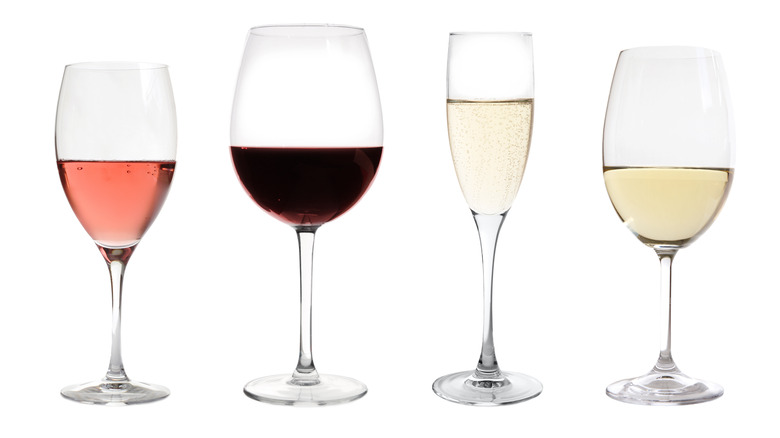How Much Wine Can You Drink On The Mediterranean Diet?
Any diet with wine included as a staple is bound to get a gold star, and the Mediterranean diet has been a popular trend for quite a while now. However, if you're really looking to boost your health by including a glass of wine (or two, or three), you may want to know, "How much wine can I really drink on the Mediterranean diet?"
To figure that out, we need to balance two factors: The health benefits of red wine and the (potentially harmful) effects of alcohol in general.
Wine contains compounds known as flavonoids, which are found in the skin of the grape (via Nutrients). According to the Journal of Natural Products, flavonoids have a variety of useful benefits, including antiviral, anti-inflammatory, and of course, antioxidant properties. The rockstar compound of this group is resveratrol, which existing research indicates may have a positive impact on longevity (via Critical Reviews in Food Science and Nutrition). Since the grape skins stay on longer when making red wine, reds have more flavonoids — and more resveratrol — than white wines.
So can I drink as much wine as I want to?
More doesn't always mean better. The research on the Mediterranean diet is limited, and doesn't mitigate the negative effects of binge-drinking alcohol. Additionally, red wine, despite being a naturally occurring source of resveratrol, only contains relatively small amounts — meaning you'd have to drink a couple hundred glasses a day to reach the amount shown to be beneficial in animal studies (via Harvard Health Publishing).
The key word, as always, is moderation. Researchers at the Mayo Clinic speculate that small amounts of any kind of alcohol, including white wine, beer, and hard liquor, can raise good cholesterol, help prevent artery damage, and reduce the formation of blood clots, among other benefits. A moderate amount would be considered one drink per day for women and men over 65, and up to two drinks for men under 65 years old. Of course, you should abstain if you have any contraindications for alcohol, such as certain medical conditions or a family history of dependency.
Still interested in the health-boosting effects of wine? Make sure to drink your daily dose along with food. According to The Wine Doctor, you can also score some added antioxidants from red grapes, blueberries, nuts, and dark chocolate (mmmmm, best diet ever).
What wine should I drink on the Mediterranean diet?
If you choose to adopt the Mediterranean diet, there's no shortage of delicious recipes you can get creative with. For example, experts at the Mayo Clinic suggest Mediterranean-style grilled salmon, beet walnut salad, or Tuscan white bean stew, just to name a few. But what kind of wine should you pair with these delicious meals? "Trying to mimic what people drink on the Mediterranean, red wine is a more popular choice," registered dietitian Lauren Manaker explains to PopSugar. As reported via AZCentral, red wines contain more phytonutrients than white wines or rosé wines. In addition, stick with red wines that haven't aged too long, as the phytonutrient amounts may have decreased over time.
So what kinds of red wine should you reach for? Pinot Noir, Malbec, and Shiraz are a few of the different types of red wine recommended by Raw Beauty Source. AZCentral also suggests keeping an eye out for red wines directly from the Mediterranean region, such as Greece, southern France, or the south of Italy, as wines from these regions are said to be higher in procyanadin, a type of flavonoid believed to be beneficial to heart health.



